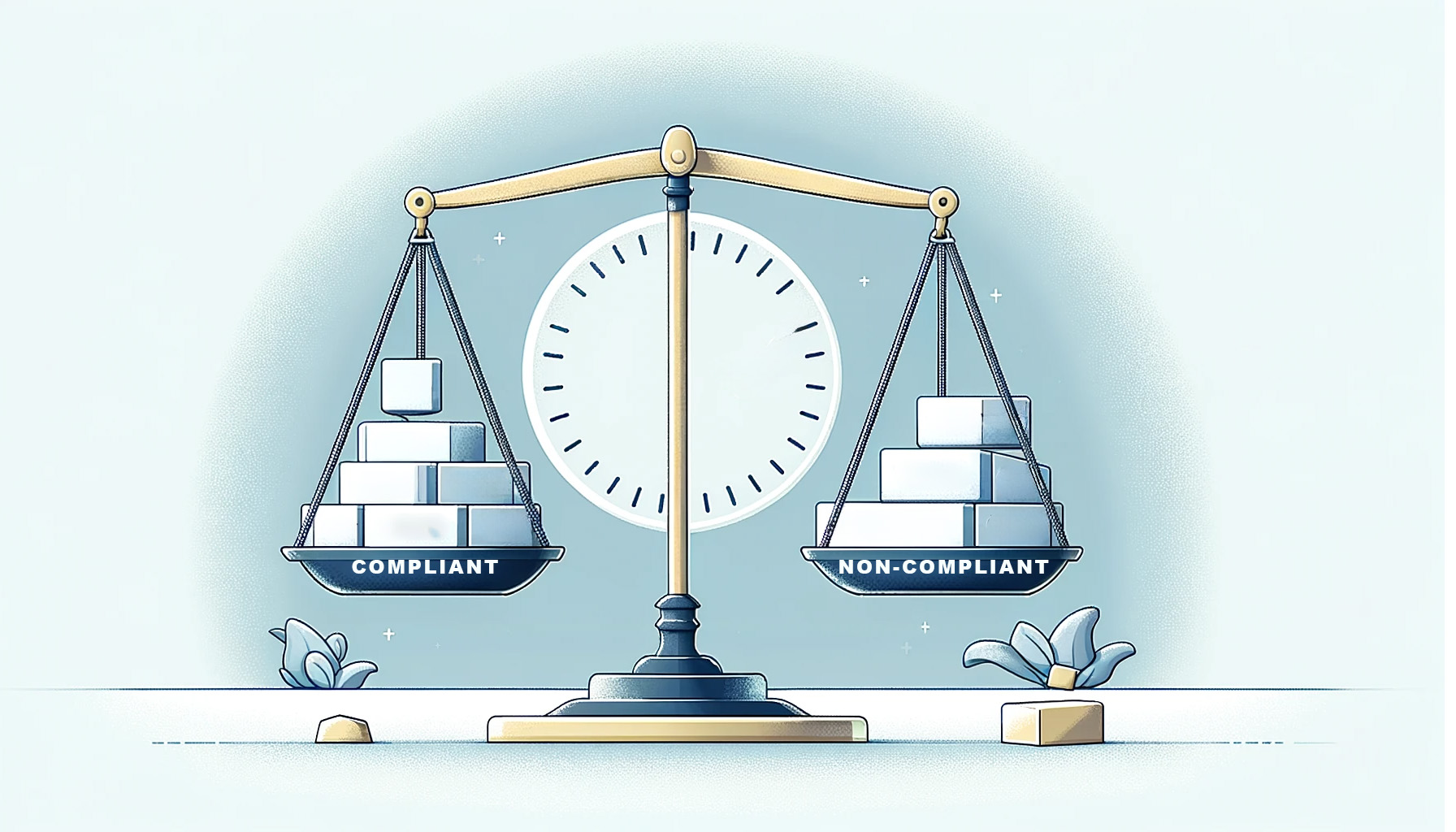
A Short, Helpful Guide to E-Commerce Compliance
Jan 31, 2024 2 minutes
Ensuring your online business operates within the legal framework is way more important than catchy ads or soaring sales. Compliance is not merely a legal requirement; it’s a cornerstone of trust and reliability in the digital marketplace.
This guide is designed to navigate the intricacies of e-commerce compliance, offering practical advice to help your online store not only meet but exceed the necessary legal standards.
Whether you’re a startup or an established player, understanding and implementing these compliance strategies is key to safeguarding your business and fostering lasting customer relationships.

Keeping your compliance and privacy tactics in-line with regulation.
Data Privacy and Protection
In the realm of e-commerce, data is king. However, with great data comes great responsibility. Ensuring the privacy and protection of consumer data is not just a good practice—it’s a regulatory requirement that can significantly impact your ecommerce business.
Understanding GDPR
The General Data Protection Regulation (GDPR) is a pivotal aspect of data privacy, especially for businesses interacting with the European Union. It mandates stringent handling of personal data, emphasizing consent, transparency, and the right to be forgotten.
Ecommerce sites must ensure explicit consent for data collection, enabling customers to easily access, rectify, and delete their information.
Implementing Robust Data Privacy Measures
Beyond GDPR, various privacy laws globally necessitate a proactive approach. This involves encrypting personal data, securely processing credit card transactions, and regularly updating privacy policies. It’s crucial to educate your team and employ clear protocols for handling consumer data.
Compliance can be tough. We can make it easy.

Checkout security is arguably the most important part of your ecom store.
Online Payment Security
The heartbeat of any ecommerce business is its ability to securely process payments. As online shopping continues to grow, ensuring a safe transactional environment is more than a convenience.
PCI DSS Compliance
At the forefront of payment security is the Payment Card Industry Data Security Standard (PCI DSS). This set of regulations is designed to ensure that all companies processing, storing, or transmitting credit card information maintain a secure environment.
For ecommerce websites, this means implementing robust encryption methods, maintaining a secure network, and regularly testing security systems. It will be very clear if the gateway and processor you use are PCI-compliant. If not, you have to pay a non-compliance fee…so you might as well just be compliant.
Building Trust with Secure Transactions
Secure checkout processes are a critical component in building customer trust. This involves not only technical safeguards but also clear communication with customers. Displaying security certifications and using trust seals can reassure consumers that their credit card data is protected.

Consumer rights is real.
Consumer Rights and Advertising
Consumer rights are only expanding. E-commerce businesses must navigate the complex terrain of advertising regulations while respecting the privacy and preferences of their customers.
Compliance with COPPA and CCPA
The Children’s Online Privacy Protection Act (COPPA) and the California Consumer Privacy Act (CCPA) set clear guidelines for consumer data collection and privacy. E-commerce websites, especially those targeting children or operating in California, need to be particularly vigilant in adhering to these regulations.
This includes obtaining parental consent for data collection from children under 13 and providing clear privacy notices as per CCPA.
Truth in Advertising
The Federal Trade Commission (FTC) mandates that all advertising must be truthful, not misleading, and substantiated. This means ecommerce companies must avoid making unverified claims and should always include disclaimers where necessary.
For instance, if a product claims to have health benefits, these claims must be backed by scientific evidence.
Protect consumer data and stay compliant with the right merchant services partner.

Inclusivity doesn’t mean targeting any one group, it means making your site and product accessible to all.
Accessibility and Inclusivity
In the world of e-commerce, accessibility and inclusivity are not just ethical imperatives; they are essential for reaching a wider audience and providing equal service to all customers.
Adhering to the Americans with Disabilities Act (ADA)
The ADA mandates that digital content, including e-commerce platforms, must be accessible to individuals with disabilities. This includes providing alternatives for visual content, ensuring website navigability through screen readers, and offering options for those with limited mobility.
Making your online store ADA-compliant is not only a legal requirement but also a way to tap into a broader customer base.
Creating an Inclusive Online Experience
E-commerce should cater to everyone, regardless of race, age, or ability. This involves designing interfaces that are easy to use for the elderly, providing language options for non-English speakers, and considering cultural sensitivities in product offerings and marketing.
The Business Case for Inclusivity
An inclusive approach not only fosters a positive brand image but also opens up new markets. For instance, an e-commerce site that introduced sign language options for its customer service saw a significant increase in engagement from the deaf and hard-of-hearing community.

All ecommerce platforms have their own rules and regulations.
Marketplace Compliance
In the ever-expanding universe of e-commerce, marketplace platforms like Amazon and Shopify have become vital for online retailers. However, operating within these marketplaces requires adherence to specific compliance standards that ensure a fair and secure shopping environment.
Compliance on Major Marketplaces
Platforms like Amazon have their own set of rules and guidelines that sellers must follow. This includes accurate product descriptions, adherence to shipping and return policies, and compliance with Amazon’s specific data privacy and security standards. Failing to comply can result in suspension or removal from the marketplace.
Shopify’s Compliance Features
Shopify, known for its user-friendly interface and extensive features, also places a strong emphasis on compliance. It offers tools and resources to help retailers comply with various regulations, including GDPR, ADA, and PCI DSS. By utilizing these tools, retailers can ensure their Shopify store meets legal standards, fostering trust and reliability.
Shopify Payments is hurting your sales. Let’s fix it.

Get money from every country.
Global Compliance: Navigating Multiple Jurisdictions
For e-commerce businesses with a global footprint, compliance is a multi-faceted challenge. Navigating the myriad of regulations across different countries and regions is crucial for international success.
Understanding Local Laws
Each country has its own set of e-commerce regulations, covering everything from data privacy to consumer rights. For example, the European Union’s GDPR significantly differs from the United States’ privacy laws. E-commerce sites must tailor their policies to meet these diverse legal requirements, ensuring that they respect local laws and cultural norms.
Currency and Payment Compliance
Dealing with multiple currencies is not just about accurate conversions. It’s also about complying with local financial regulations and payment processing standards. Understanding and implementing these standards is key to smooth, lawful international transactions.
Adapting to Regional Differences
Beyond legal compliance, understanding regional preferences and behaviors is crucial. This includes adapting marketing strategies to local tastes and ensuring that your product offerings are appropriate for different cultures.

Non sense in hiding, you’ll get caught.
Avoiding Non-Compliance: Risks and Consequences
In the intricate world of e-commerce, non-compliance isn’t just a minor oversight; it’s a significant risk that can have severe consequences for your business.
Legal and Financial Penalties
The most immediate impact of non-compliance is often legal and financial. This can range from fines and penalties imposed by regulatory bodies to costly litigation. For instance, companies that fail to adhere to data privacy laws can face fines amounting to millions of dollars.
Reputational Damage
Beyond financial repercussions, non-compliance can severely tarnish a company’s reputation. In an era where consumers are increasingly conscious about data privacy and ethical business practices, any hint of non-compliance can lead to a loss of customer trust and loyalty.
Operational Disruptions
Non-compliance can also lead to operational setbacks. This includes the suspension of business activities, the revocation of licenses, or even the complete shutdown of the online store.
Preventive Measures
The key to avoiding these risks lies in proactive compliance. Regular audits, staying informed about regulatory changes, and fostering a culture of compliance within the organization are crucial steps in safeguarding against non-compliance.

Riches are coming your way.
Staying Compliant Is Easy
As we’ve explored the various facets of e-commerce compliance, it’s clear that adherence to legal standards is not just a regulatory requirement; it’s a pathway to building a robust, reputable, and successful online business. The journey of compliance is an ongoing one, with each step bringing you closer to establishing a strong foundation of trust with your customers.
For businesses operating in high-risk industries or dealing with complex transactions, the significance of having a high-risk merchant account cannot be overstated. Such accounts are tailored to meet the unique needs of your business model, offering greater security and flexibility in processing transactions.
Opening a high-risk merchant account could be the strategic decision that propels your business forward, mitigating risks and opening doors to new opportunities.
Take this moment to reflect on your e-commerce journey and consider the benefits of a high-risk merchant account. Embrace compliance, not as a hurdle, but as an opportunity to elevate your business to new heights of success and integrity.




